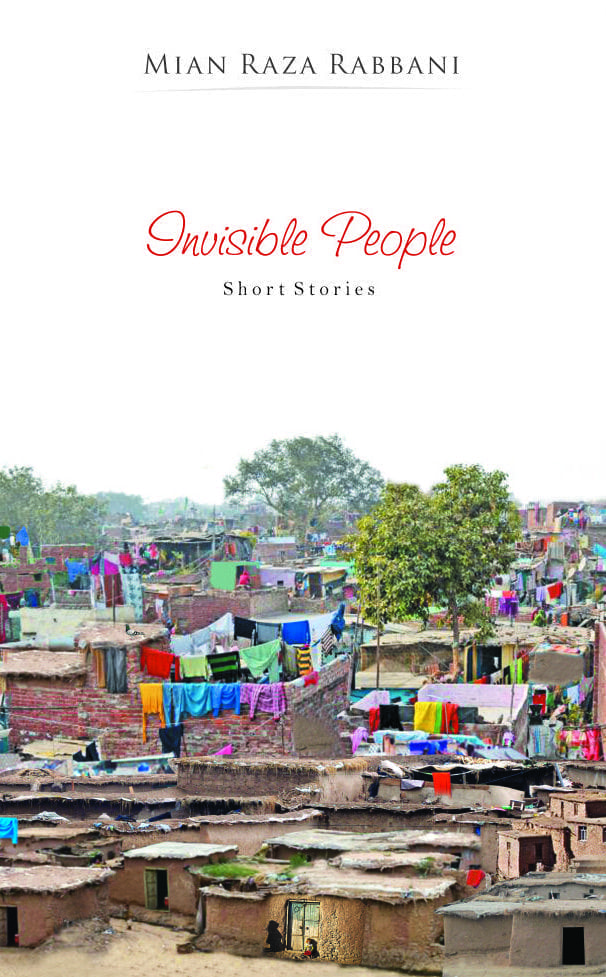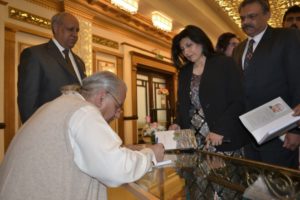
Invisible People – Short Stories
Our political rules are forever wont to swear by the people – the awam. But they live in a security bubble, protected from the raw winds of reality that have engulfed the lives of ordinary citizens of this country. Mian Raza Rabbani, who has earned the exalted position of Chairman of the Senate Pakistan, has defiantly stepped out of that gilded cage to venture into the lower depths of our society, and bear witness to the misery and deprivations of the ‘Invisible People’.
For many, this collection of short stories would be a revelation. A leading politician is making his appearance as a creative writer. But his stories tend to explore the same passions that Raza Rabbani has invested in his politics. I am reminded of how Franz Fanon analyzed the dehumanizing effects of colonization in his celebrated ‘The Wretched of The Earth’, though the approach here is not academic or scholarly. Raza Rabbani has given us glimpses of the lives of individuals who have been wronged and betrayed by a system that is shamelessly elitist. He has the gift of telling a story and his stories certify his capacity for empathy and compassion. His characters come out alive against shifting backdrops of our society. Their ‘invisibility’ is the reality of Pakistan.
Ghazi Salahuddin, columnist of The News.
This remarkable collection of stories from the eminent politician, human rights advocate and constitutional scholar Senator Raza Rabbani demonstrates a subtle literary imagination. His accounts of ordinary people, often engaged in a doomed quest for justice, engage us all the more because these folk barely seem to exist for those who profit from their labors. Indeed, the men and women in these tales are the invisible members of our society. The author tells their stories with a wonderful mix of art and mysticism.
Mazhar ul Islam, author of Love: Symphony of Dead Flowers. A poor village boy abandons dreams of an education to serve in an imperial house. A village girl is stolen away into captivity by a shaman with a magic box. A sick factory worker languishes in the shadows of a hospital while his wealthy boss walks past him. A peasant with liver disease sings mournful songs of unrequited love on a hospital ward to quell the pain. Two courtesan sisters are sent to a garish concrete mansion for the pleasure of its wealthy owners. An orphan boy is sold to a wicked warehouse manager who turns a profit with an army of trained and maimed street children.
With sparse eloquence and candour, Raza Rabbani’s beautiful collection unfurls a panoply of Dickensian scenes that delve beneath the surface of lives of villagers and urban strivers, of orphans and women, their mementos held fast in old tin trucks.
Vividly draw, with striking empathy and wisdom, these evocative stories possess the depthless quality of fables, though written with realist intent, exploring the neglected underside of modern Pakistani life at its most harsh. Yet in spite of the cruelty of this world, Rabbani’s writing reveal a warmth and vibrancy in the lives of ordinary folk, with their melancholic belief in saints and charms, in poetry and song, and in the divine ordination that appears to determine their suffering in this world. The power and beauty of the stories is impressive.
Rosie Dastgir, author of A Small Fortune.
Raza Rabbani, a prince amongst the players of politics, whose reputation was never polluted, integrity never tainted, no doubt a threatened specie in the arena of present day political war games. However, he is an innocent soul, he was unaware of the fact that the Myna bird who flew in through his open window, disturbing his VIRD, fluttering about in panic, was no ordinary bird, it was not searching for a way out, it was searching for the eternal truth. This Myna was a message from Farid-ud-Din Attar of Neshapur, right out of his mystical book, ‘The conference of the birds’ or ‘Manteq at Tair’ to be exact. Amongst all the birds of this and other world who flew towards the mountain of Kaf, crossing desserts, oceans and seven mystical valleys, thousands perished during this flight and only a few reached their destination, Lo and Behold when the curtain rises they see in front of them their own glittering image because they themselves were the ultimate truth.
This Myna fluttering in Raza Rabbani’s room was one of those Attar’s birds, who were witness to the final truth, no ordinary bird and she had tales to tell, tales of sorrow, injustice and human sufferings. Raza Rabbani’s short stories are a mere reflection of those tales narrated by a Myna, a message of Attar. At times going through Raza Rabbani’s stories I encountered a strange deception, perhaps Raza Rabbani is also a bird from, ‘The conference of the birds’ in quest of ultimate truth, who has fluttered into my study to narrate his fascinating tales. Welcome aboard the sinking ship of literature in Pakistan.
Mustansar Hussain Tarar, most outstanding fiction writer of Pakistan.
Launch: February 8th, 2017



